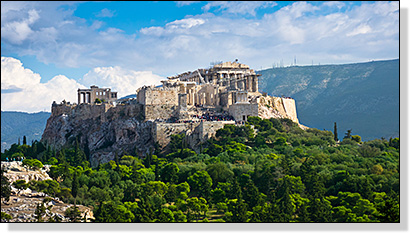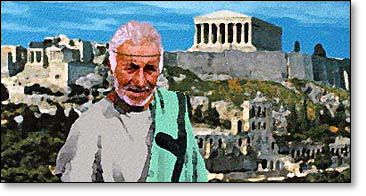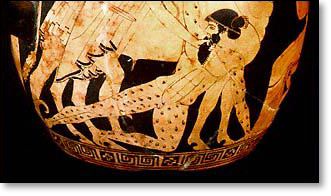Achilles (a-KILL-eez). The best fighter of the Greeks besieging Troy in the Trojan War. When the hero Odysseus journeyed to the Underworld to seek the advice of the dead prophet Teiresias, he encountered the shade of Achilles. This hero had slain the Trojan hero Hector in single combat and had himself been brought down only by the connivance of Apollo. The god guided the arrow of Hector's brother Paris to the only vulnerable spot on Achilles' body - his heel.
 Achilles would not have been vulnerable even in this part of his body had his mother, the sea-goddess Thetis, been allowed to protect him as she intended. When he was an infant, she rubbed him each day with godly ambrosia, and each night she laid him upon the hearth fire. Unfortunately, Achilles' father was unaware that this procedure would make his son immortal. And when he unexpectedly came home one night to find his wife holding their baby in the flames, he cried out in alarm. Thetis was offended and went home to her father, the Old Man of the Sea, leaving Achilles to his mortal fate.
Achilles would not have been vulnerable even in this part of his body had his mother, the sea-goddess Thetis, been allowed to protect him as she intended. When he was an infant, she rubbed him each day with godly ambrosia, and each night she laid him upon the hearth fire. Unfortunately, Achilles' father was unaware that this procedure would make his son immortal. And when he unexpectedly came home one night to find his wife holding their baby in the flames, he cried out in alarm. Thetis was offended and went home to her father, the Old Man of the Sea, leaving Achilles to his mortal fate.
 Another version of the myth has Thetis attempting to protect her infant by dipping him in the river Styx. The infernal waters indeed rendered Achilles' skin impervious to the likes of any mere Trojan arrow. But Thetis forgot that she was holding him by the heel during the dipping process, so that part was unprotected.
Another version of the myth has Thetis attempting to protect her infant by dipping him in the river Styx. The infernal waters indeed rendered Achilles' skin impervious to the likes of any mere Trojan arrow. But Thetis forgot that she was holding him by the heel during the dipping process, so that part was unprotected.
|
| | Acrisius (a-KRISS-ee-us). King of Argos and brother of King Proetus of Tiryns. Acrisius was warned by an oracle that he would be killed in time by a son born to his daughter Danae. So he promptly locked her up in a tower and threw away the key. But the god Zeus got in, disguised as a shower of gold, and became the father of Perseus.
| |
| |






